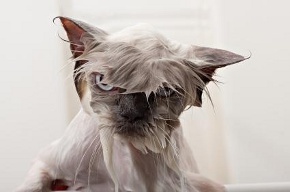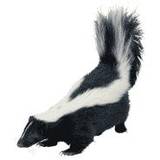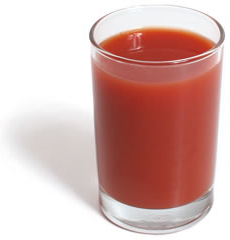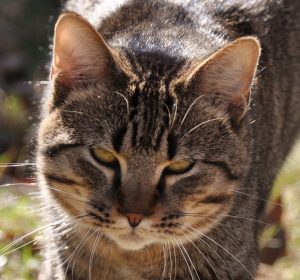External odors, such as skunk spray, are much easier to treat than internal odors. If your pet has rolled in manure or a dead animal, which they like to do, a regular bath will probably take care of the smell. If the offensive odor is more intense, an odor-neutralizing enzymatic product ought to work. So will good old tomato juice.

Bathing Your Pet
 In addition to treating odors, bathing is one of the safest and most effective ways to control fleas (see Parasites). Don’t bathe your pets too often, though, or you can dry out their skin. Cats often don’t need bathing because they are fastidious groomers. Unless your dog is unusually dirty, bathing once every couple of months is fine. If, however, your pet has fleas or skin discharge, you may want to give a bath once a week. Use a mild, natural shampoo or castile soap that doesn’t strip the oils too harshly, and always make sure you thoroughly rinse all soap off afterward. Leaving soap on your pet will cause itching.
In addition to treating odors, bathing is one of the safest and most effective ways to control fleas (see Parasites). Don’t bathe your pets too often, though, or you can dry out their skin. Cats often don’t need bathing because they are fastidious groomers. Unless your dog is unusually dirty, bathing once every couple of months is fine. If, however, your pet has fleas or skin discharge, you may want to give a bath once a week. Use a mild, natural shampoo or castile soap that doesn’t strip the oils too harshly, and always make sure you thoroughly rinse all soap off afterward. Leaving soap on your pet will cause itching.
Skunk Spray and Other Smells
 You ought to keep an odor-neutralizing product on hand. Not only are these enzymatic cleaners good at removing skunk spray, they’re also good for removing smells around the house caused by urine, feces, and vomit. The enzymes digest and decompose the protein molecules in these substances, which eliminates odor. To use on your pet, follow the package directions.
You ought to keep an odor-neutralizing product on hand. Not only are these enzymatic cleaners good at removing skunk spray, they’re also good for removing smells around the house caused by urine, feces, and vomit. The enzymes digest and decompose the protein molecules in these substances, which eliminates odor. To use on your pet, follow the package directions.
If your pet gets sprayed by a skunk, try to perform the treatment outside because it could take weeks to remove the odor from your house. Your pet’s eyes may have been sprayed, causing irritation. Use any of the eye washes listed for irritation on the Eye Problems page, or use eye drops designed for human eye irritation.
 If you use tomato juice, don’t bathe or water down your pet first. Saturate your pet’s fur with full strength canned tomato juice, and let it sit for at least twenty minutes, maybe longer. If your pet still smells, repeat the process. Another alternative cleansing solution can be made with one quart hydrogen peroxide, ¼ cup baking soda, and a little dish soap. This peroxide method is many people’s first choice. You can also saturate the fur with the solution from a vaginal douche product.
If you use tomato juice, don’t bathe or water down your pet first. Saturate your pet’s fur with full strength canned tomato juice, and let it sit for at least twenty minutes, maybe longer. If your pet still smells, repeat the process. Another alternative cleansing solution can be made with one quart hydrogen peroxide, ¼ cup baking soda, and a little dish soap. This peroxide method is many people’s first choice. You can also saturate the fur with the solution from a vaginal douche product.
The Litter Box
Another external odor that can be problematic comes from the litter box. Make sure that you are cleaning the litter box every day. We do not approve of the clumpable litters that are popular nowadays. People tend to just scoop out the lumps and leave loads of bacteria behind, in the sand, to fester for days, weeks, even months. Besides being unhealthy, this bacteria causes odor.
The litter box method we use is one we picked up at veterinary hospitals. Instead of filling a large pan full of litter and either changing it each day or just taking out the lumps, place some newspaper or a liner in the clean pan, and then put a sifting of litter on top.  Each time your cat defecates, grab up the whole mess in a bundle, and replace it with new paper and new litter. This method is very easy, very clean, and very efficient.
Each time your cat defecates, grab up the whole mess in a bundle, and replace it with new paper and new litter. This method is very easy, very clean, and very efficient.
In line with the holistic mindset, it’s always best to get to the root of the problem and fix it, instead of masking symptoms. If, however, you feel as though an area of your house could use some deodorizing, orange, citrus, lavender, and pine sprays are good choices for pet odors. In her book, Veterinary Aromatherapy, Nelly Grosjean recommends a blend of lavender, terebinth, lemon, and mint oils. Don’t use verbena as a litter box deodorizer because it will repel your cat, and you don’t want your cat repelled from the litter box.
Odors from Within
If your pet has an internal odor, marked by symptoms such as bad breath, the first thing to do is to improve the diet. Feed a balanced and natural raw meat diet made from quality ingredients.
Raw bones and gristle are the best solution for dental problems unless the tooth decay is too far advanced. You can also use one of the toothpastes formulated for pets. Some people use these products with a toothbrush, but it may be easier to use gauze wrapped around your finger. See the Dental page for more information.
Adding finely minced parsley  to your pet’s food is also an internal deodorizer. Peppermint oil can be helpful with dogs, both internally and externally, but cats don’t usually like it.
to your pet’s food is also an internal deodorizer. Peppermint oil can be helpful with dogs, both internally and externally, but cats don’t usually like it.
Brush or comb your pet daily to help remove old hair and debris. If your pet is going through a detox process, for example if the diet has improved, you will want to help the skin eliminate toxins that are being expelled. As mentioned above, bathing too frequently can strip oils from the fur, whereas brushing distributes these oils and helps to keep the coat healthy.
If your pet has chronic bad breath or odors coming from another orifice, see a holistic veterinarian. Body odor emanating from within can be a symptom of cancer, parvo, colitis, kidney disease, thyroid problems, and other illnesses.